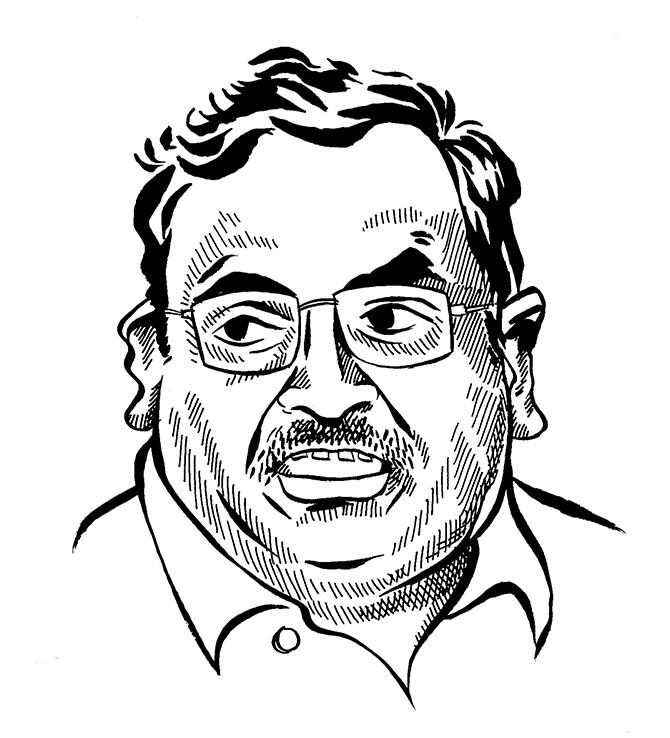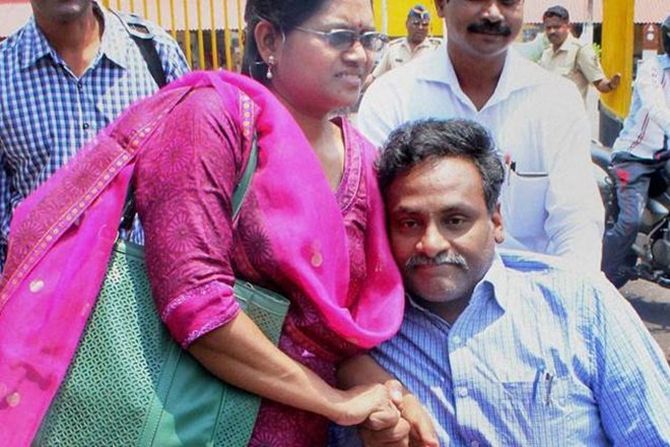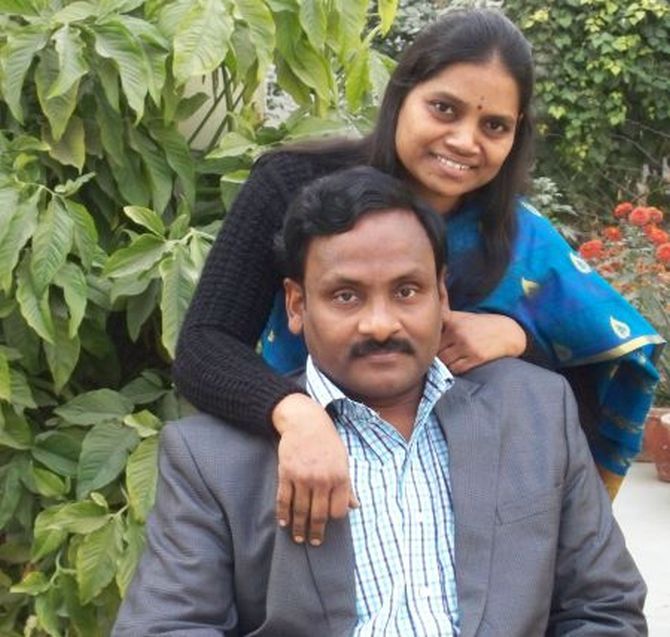'People accused of mass murder and worse are let out on medical grounds.'
'Saibaba is now 100% handicapped, and has committed no murder, yet he is not allowed to come out.'
Jyoti Punwani reports.

Vasantha Kumari had last spoken to her husband, serving a life sentence in the Nagpur Central Jail, on July 5. So she wasn't expecting his call again just nine days later.
Normally, the call would have been a pleasant surprise. Since May 1, Vasantha has spoken to her husband, Professsor G N Saibaba, only twice a month, barely for five minutes each time.
What the 90% handicapped Delhi University professor, convicted in 2017 for allegedly aiding Maoists, told her, has left her reeling.
The coronavirus was spreading through not only his jail, but his own barrack. A prisoner in the Anda Cell where he has spent the last three-and-a-quarter years had tested positive, he said.
So serious was the situation that this emergency call had been permitted by the jailers.
"For Sai, COVID-19 is a death sentence," says Vasantha.
"Apart from being totally handicapped and unable to move without help, he has a heart problem and so many other ailments. Given the nature of COVID-19, who will look after him in jail? He will just be left to die alone."
As far back as November 2017, barely eight months into his sentence, Professor Saibaba had written a letter to his wife saying: 'I am living here like an animal taking its last breaths..'
Today, his condition is far worse.
With repeated spells of imprisonment since 2014 having prevented medical care, the professor, afflicted with post-polio paralysis of the legs since the age of 5 and dependent on a wheelchair, has now almost lost the use of both his hands. They tremble so much that to take a spoon to his mouth becomes difficult, says Vasantha.
In December 2018, Dr M F Gopinath, a cardiologist from Khammam, Telengana, examined him on the orders of the Bombay high court, at Nagpur's Government Medical College and Super Speciality Hospital. Dr Gopinath's report sheds light on what the Nagpur jail authorities have in mind for the professor.
Dr Gopinath found that Professor Saibaba had heart muscle disease; chronic pancreatitis; multiple stones in his gall bladder, and prostate enlargement.
Tests recommended by Government Medical College Neurologist Dr Sanjay Ramteke were not done because the hospital didn't have the necessary equipment. Dr Ramteke had recommended that Professor Saibaba be shifted to the J J Hospital in Mumbai or any other better equipped hospital.
The medical report has some disturbing notes.
- Professor Saibaba's abdominal scan was initially done by post graduate trainee students, and the results were shown as normal. It was only after Dr Gopinath insisted that a senior radiologist was called in.
- The jail security personnel accompanying Professor Saibaba intimidated the doctor, not allowing him to keep the records of his findings. He had to request the hospital for photocopies of the papers of investigation carried out by him.
- Professor Saibaba was recommended daily special occupational physiotherapy, but the equipment required was unavailable both at the hospital and in jail.
- Whenever he complained of severe pain in his chest, abdomen or while urinating, Professor Saibaba was given pain killers and sleeping pills which could damage his mental condition and lead to internal bleeding.

During the lockdown, Professor Saibaba was taken to the Government Medical College and Super Speciality Hospital twice, he told his wife. On his last visit on June 25, apart from an operation of the gall bladder, doctors recommended the administration of hot and cold packs, use of a medical bed and six side pillows to ease his shooting pain in his back.
None of this has been provided.
Thanks to the lockdown, his medicines too have not been reaching him on time. In fact, all through April, Vasantha could not contact him.
As an undertrial (2014-2016), and later as a convict, other jail inmates, many of them Adivasis, voluntarily helped him, knowing that he was in jail for speaking up for their rights.
"However, since the last several months, those who used to help him have stopped doing so." Perhaps they too are depressed," says Vasantha.
What does this mean?
Unable to go to the toilet on his own, unable to wash his clothes on his own, he lies helpless in soiled clothes.
This is a PhD, a professor with 14 years's experience in a public university, popular among his students. Three appeals by United Nations human rights experts to shift him to a better equipped jail nearer his family; to provide him urgent medical care; to remove him from solitary confinement, have failed to move the government.
In March 2019, Professor Saibaba was denied bail by the Nagpur bench of the Bombay high court. Judges P N Deshmukh and Rohit B Deo accepted the jail authorities' claim that the professor was being well looked after in jail. Since he had been convicted for aiding Maoists, he could not be released.
"I don't know how courts view convicts," says Vasantha with a small laugh. "People accused of mass murder and worse are let out on medical grounds, and the charges against them are whittled down. Saibaba is now 100% handicapped, and has committed no murder, yet he is not allowed to come out."
If not bail, parole remains a hope for convicts who have spent three years in jail. Moreover, parole and bail have been recommended by the Supreme Court to decongest jails in view of the COVID-19 threat in crowded spaces.
In his application for Professor Saibaba's parole, his younger brother, a physics lecturer in Hyderabad, wrote that their mother was suffering from cancer and living with him in Hyderabad.
Not even that made any difference to the jail authorities.
His mother taught Saibaba to cope with his disability as a child, and guided him all through school and college. She asks for him constantly, says Vasantha.
Unfortunately, by the time his parole plea reached the Bombay high Court, his brother's residence had fallen in the COVID-19 containment zone, so Professor Saibaba could not be sent there.
It is not just the jail authorities.

Vasantha has written to Nationalist Congress Party President Sharad Pawar once, and Maharashtra Home Minister Anil Deshmukh (also of the NCP) thrice, but has yet to get a reply, though the letter to Pawar was sent in February, and to Deshmukh in February, March and April.
It is well within Deshmukh's power to direct the jail authorities to grant the professor parole.
There is also the matter of the flimsy evidence that his conviction is based upon. Norms of evidence were brazenly flouted during the trial by the Gadchiroli district and sessions court.
- The only panch examined with regard to seizure of electronic items and books from his home in December 2013 told the court that he waited with Professor Saibaba outside the house while the seizure was taking place, and signed the report later.
- A prosecution witness supposed to be an agricultural worker turned out to be a home guard employed by the police. The defence proved in court that he was a stock witness. Yet his testimony was not rejected.
- Procedures of house search, seizure and arrest were flouted.
Yet, Judge Suryakant Shinde convicted him to life.
As Professor Saibaba stares at a dark tunnel, how does Vasantha Kuamri cope, emotionally and financially? Their daughter is now an M Phil student.
"He is still getting half his salary and his friends continue to help us out financially," says Vasantha. "I try to calm my mind with gardening. What else can I do."
Does she now feel her husband should have remained just a professor, and not gone out of his way to speak up for the rights of Adivasis in Bastar who were being hunted down by the State-sponsored Salwa Judum? It was after all this strident opposition that brought the authorities' wrath on the professor.
In the past, whenever I asked Saibaba and Vasantha this question, they rejected the idea of regretting this dissent. But the situation has never seemed as hopeless as it does now.
Says Vasantha, "No, I don't regret anything. In fact, I keep thinking of all those who are not fortunate enough to have the support that I do.
"Nagpur is a new city for me, yet, there are lawyers willing to fight for my husband. Though his main lawyer Surendra Gadling is himself in jail (accused in the Bhima Koregaon case), his juniors are working hard. Friends are supporting me.
"What of those whose family members are in Nagpur jail, who live far away and know no one in Nagpur?"
Feature Production: Aslam Hunani/Rediff.com










